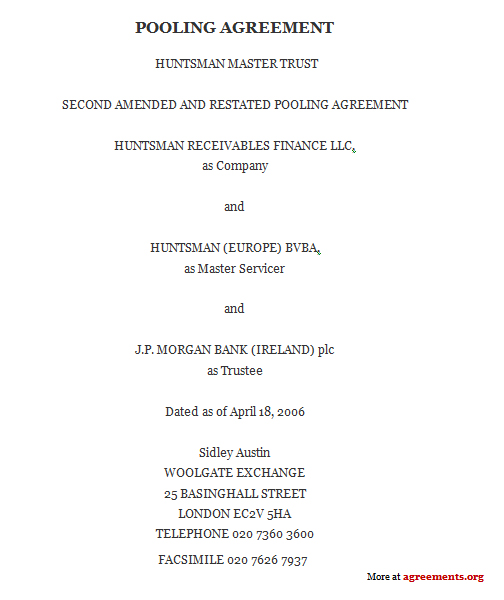What is a pooling agreement? A Pooling Agreement is an agreement through which shareholders of a company pool their voting rights and assign those rights to a trustee. Thereafter, the trustee exercises the voting rights on behalf of the shareholders.
Such agreements are also called voting agreements or shareholder-control agreements, vote pooling agreement since they are used to control the affairs of the company. With this strategy, a group of shareholders agrees to vote the same way for directors ahead of time, making it more difficult to influence the vote. It involves combining the rights attached to shares and using them together as a unit so as to maintain a majority in the voting process. The agreement can be among any number of shareholders.
When Do You Need a Pooling Agreement
A pooling agreement is needed when certain shareholders of a company decide to pool the voting rights attached to their shares and transfer them to a trustee. The shareholders agree that their shares will be voted as a unit. Therefore, a voting trust is created between a group of shareholders and the trustee to whom they transfer their voting rights.
This purpose of this agreement is to lay down the terms and conditions of the transfer of their voting rights. By combining their voting powers and transferring those voting rights to a trustee, it increases trustee’s influence on different corporate decisions and strategies.
The agreement does not change the ownership of the stock which remains with the shareholder.
Inclusions in a Pooling Agreement
This agreement must clearly state the names of the parties between whom the agreement is entered into. This will include shareholders who are transferring the voting rights and the trustee to whom the rights are being transferred.
Every pooling agreement must mention the duration for which it will be valid after which the agreement will expire and the voting rights will go back to the shareholders. It must also provide the manner in which the trustee is to be appointed.
The date on which the agreement is entered into must also be mentioned along with the territory in which the agreement is enforceable. Apart from this, the agreement must clearly mention under which law it will be governed and how the agreement shall be terminated. The manner in which the agreement is to be modified should also be described.
How to Draft a Pooling Agreement
The following are the steps to be followed while drafting a pooling agreement:
- The first step is to check if the shareholder agreement allows for pooling of voting rights While vote pooling is generally legal, it may be in some cases be disallowed by the shareholder agreement.
- The second step is to decide the trustee to whom the voting rights are to be transferred.
- After this, the term of transfer of the voting rights should be determined.
- The agreement shall provide for all important clauses such the process of appointment of the trustee and the manner in which he is to perform his duties etc.
- Once the agreement is drafted, it must be reviewed thoroughly to make sure that it contains all the matters that were mutually agreed between the parties and that it protects the interests of both parties.
Benefits of a Pooling Agreement
- These agreements are used to control the affairs of the corporation and to control the management of a company
- This agreement can be used to influence different corporate decisions and strategies
- These agreements are created to enhance the chances of election of a director who is conducive to the predetermined action plan of the shareholders.
- It is much more difficult to sway the votes of these shareholders because they agree ahead of time to vote together.
Key Clauses in a Pooling Agreement
The following are the key terms of a pooling agreement:
- Appointment of trustee
- Deposit of shares
- Release of the pooled shares
- Certain rights of the shareholders
- Rights attached to pooled shares
- Alteration of capital
- Transfer within the pool
- Duties of trustee
- Risk to trustee
- No investigation by trustee
- Trustee’s execution of power
- Trustee reporting
- Fees of the trustee
- Indemnification of the trustee
- Successor to trustee
- Resignation of trustee
- Events of default
- Limitation of liability
- Indemnification and damages
- Modification of the agreement
- Termination of the agreement
- Governing law and jurisdiction
- Dispute resolution and arbitration
- Notices
What Happens in Case of Violation?
Generally, pooling agreements have a clause that talks about the actions to be taken when a party to the agreement breaches the clauses of the said agreement. An arbitration clause is present in most agreements and states that if a clause of the agreement is breached or if any dispute arises with respect to the terms of the agreement, the matter will be resolved by arbitration. The clause mentions where the arbitration proceedings will take place i.e. seat of arbitration, the language in which the proceedings shall be conducted and the manner in which the arbitrator shall be appointed.
Alternatively, any other form of dispute resolution such as mediation or negotiation may also be mentioned in the agreement.
The agreement can also mention that all disputes arising out of the agreement will be subject to the exclusive jurisdiction of a specified court.
Sample of a Pooling Agreement
If you require a template of a pooling agreement, you can download a sample here.
